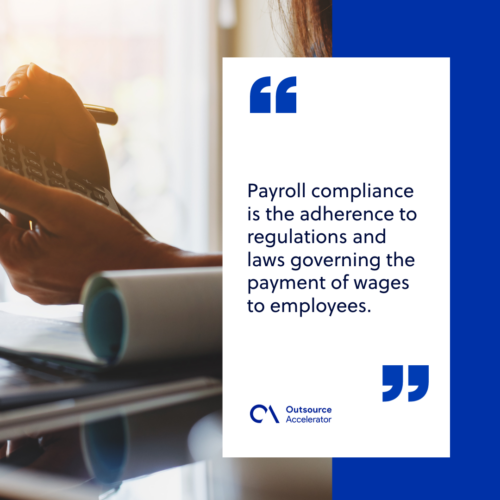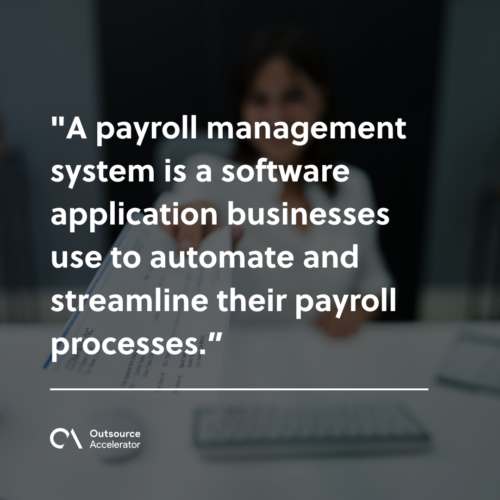13 payroll best practices for compliance

Navigating the intricacies of compliance is crucial for businesses aiming for ethical operations and legal adherence.
Drata’s 2023 Compliance Trends Report showed that 87% of organizations experience negative outcomes due to low compliance. That’s why it’s important that every facet of a business abides by regulatory and legal obligations.
One such responsibility is ensuring compliance with payroll. It involves adhering to laws and regulations related to employee compensation and tax deductions.
In this guide, we explore 13 effective payroll best practices for compliance. We will also discuss must-follow requirements and the benefits of using a payroll management system.
What is payroll compliance?
Payroll compliance is the adherence to regulations and laws governing the payment of wages to employees. It’s not merely a legal necessity but a fundamental aspect of responsible business operations.
Compliance ensures that organizations meet their financial obligations to employees while staying within the boundaries of the law.
Some laws related to payroll regulations include:
- Fair Labor Standards Act (FLSA)
- Federal Insurance Contributions Act (FICA)
- Equal Pay Act (EPA)
- Federal Unemployment Tax Act (FUTA)
- General laws and regulations regarding taxes
By implementing effective payroll best practices, businesses meet legal requirements and create streamlined processes contributing to overall compliance and operational efficiency.

Requirements for payroll compliance
To ensure compliance with payroll, organizations must adhere to several key requirements, which include:
- Calculating payroll. Accurately calculate employee wages based on hours worked, pay rates, overtime, commissions, bonuses, and any other applicable factors
- Paying employees. Ensure timely and accurate payment of employee wages, including regular pay, overtime pay, and any additional compensation as per employment agreements or legal requirements.
- Filing payroll-related government forms. Complete and submit payroll-related government forms as required by federal, state, and local authorities.
- Submitting withholdings from employee pay. Withhold and remit taxes from wages, including federal income tax, state income tax, Social Security tax, and any other applicable taxes or deductions.
- Submitting employer-owed payroll taxes. Remit employer-owed taxes to the appropriate government agencies, such as Social Security and federal and state unemployment taxes.
- Filing end-of-year payroll taxes and reports. Complete and file end-of-year payroll tax reports, including Form 941 for quarterly tax filings, Form 940 for federal unemployment tax, and any other required annual tax filings.
Importance of payroll best practices for compliance
Adhering to payroll best practices ensures that employees receive the compensation they are entitled to and that all legal obligations are met.
By following payroll best practices, organizations can:
Avoid legal consequences
Following payroll regulations helps companies prevent legal issues such as lawsuits and penalties.
For example, underpaying employees or misclassifying them can lead to lawsuits for wage theft or violations of labor laws.
Service providers like Connext understand the value of following payroll regulations. They follow labor laws and payroll standards in the Philippines and Latin America to avoid legal liabilities in the long run.
Enhance employee trust
Timely and accurate payroll processes help maintain trust and confidence among employees.
When employees are paid correctly and on time, it fosters a positive work environment and ensures employee satisfaction.
Improve business reputation
Adhering to payroll best practices for compliance strengthens an organization’s reputation.
A company known for treating its employees fairly and respecting employment laws is likely to attract top talent and gain the trust of customers and stakeholders.
13 payroll best practices to follow
Adopting effective payroll best practices enhances amenability and contributes to overall operational efficiency. Here are 13 useful strategies to implement:
1. Automating payroll processes
Use payroll management software to automate payroll calculations, tax withholdings, and filings. Automation reduces the risk of human errors and streamlines the payroll process.
2. Staying updated with laws and regulations
Regularly review and monitor federal, state, and local payroll law updates. Stay informed about changes in minimum wage rates, overtime regulations, and tax requirements to ensure conformity.
3. Establishing clear payroll policies
Create and share clear payroll policies and procedures with employees. This includes guidelines for recording time worked, submitting leave requests, and ensuring accurate pay calculations.
4. Maintaining accurate records
Keep detailed records of employee compensation, tax deductions, and payroll transactions. Accurate record-keeping is essential for audits, tax filings, and resolving disputes.
5. Conducting regular audits
Regularly audit payroll processes to identify and rectify any errors or inconsistencies in payroll calculations.
Auditing helps ensure accuracy and compliance while demonstrating a commitment to fair and lawful payroll practices.
6. Implementing strong data security measures
Safeguarding employee data is crucial. Establish strict protocols for storing and handling payroll information, including:
- Encryption for sensitive data
- Restricted access to payroll systems
- Regular backups
Protecting employee information helps mitigate the risk of data breaches and ensures adherence to privacy laws.
7. Adhering to payroll deadlines
Ensure that payroll processing, tax filings, and other related tasks are completed within the designated deadlines.
Late payroll filings can result in penalties and interest charges. Set reminders and establish a clear calendar of important dates to keep track of payroll-related deadlines.
8. Maintaining proper classification of employees
Properly classifying employees as full-time, part-time, or independent contractors is essential for complying with tax laws and wage regulations. Misclassification can lead to legal and financial consequences.
Understand the criteria for classifying employees correctly and regularly review classifications to ensure accuracy.
9. Maintaining transparent communication with employees
Openly communicate with employees about payroll matters, including pay policies, changes in compensation, and any deductions. Provide clear pay stubs that detail the breakdown of wages, taxes, and any deductions.
Encourage employees to ask questions or raise concerns regarding their pay to promote transparency and trust.
10. Conducting regular internal and external audits
In addition to regular payroll audits, consider conducting internal and external audits periodically. This identifies any discrepancies, errors, or potential compliance issues.
These audits provide an opportunity to assess and improve payroll processes, ensuring accuracy and adherence.
11. Invest in payroll training and education
Providing training and ongoing education to payroll staff can significantly enhance payroll best practices. This can involve:
- Staying updated on changing payroll laws and regulations
- Learning about new software functionalities
- Attending relevant industry workshops or webinars
Regular training ensures that payroll staff have the knowledge and skills to handle complex payroll processing accurately and stay dutiful with regulations.
12. Conduct regular salary benchmarking
It is essential for businesses to conduct regular salary benchmarking to ensure that their compensation levels remain competitive in the market. This involves researching and analyzing salary data for similar roles within the industry and geographical area.
By regularly comparing their salaries to industry standards, companies can:
- Make informed decisions about employee compensation
- Attract and retain top talent
- Avoid the risk of underpaying employees
13. Foster collaboration between HR and payroll departments
Effective communication and collaboration between HR and payroll departments is crucial for seamless management.
Regular meetings between the two teams can help to align HR policies and employee data with accurate and timely payroll processing.
By fostering collaboration, HR can provide the necessary payroll-related information, like new hires, terminations, promotions, or changes in employee status. This verifies that payroll calculations and deductions are accurate and amenable to relevant regulations.
Benefits of a payroll management system
Implementing a robust payroll management system can also help ensure compliance. It streamlines processes and offers numerous benefits.
But first, let’s define what it is:
What is a payroll management system?
A payroll management system is a software application businesses use to automate and streamline their payroll processes. It serves as a centralized platform to:
- Calculate employee wages
- Handle deductions and withholdings
- Generate paychecks or facilitate direct deposits
- Maintain compliance with tax regulations

Advantages of using a payroll management system
Using a payroll management system offers several benefits for complying with payroll regulations. These include:
- Accuracy. A payroll management system automates complex calculations. It helps reduce the risk of errors and ensures accurate and timely pay disbursements.
- Efficiency. Streamlining payroll processes through automation saves time and resources. This enables HR and payroll teams to focus on more strategic tasks rather than manual calculations.
- Compliance. Payroll software often comes equipped with features to ensure compliance with relevant regulations. It can keep track of tax rates, generate necessary forms, and facilitate tax filings, minimizing the risk of non-compliance.
- Reporting and analytics. Payroll systems provide robust reporting capabilities, enabling organizations to analyze and generate essential payroll reports. These reports help management make informed decisions, monitor labor costs, and comply with reporting requirements.
- Employee satisfaction. Punctual and accurate payments play a role in creating a positive employee experience. It aids in boosting morale and reducing the likelihood of turnover.
Keep payroll best practices for compliance in mind
Payroll compliance is like the backbone of ethical business moves. It’s not just about ticking legal boxes — it’s about keeping employees happy and your reputation intact.
So, how do you nail it?
Start by adopting smart payroll best practices and investing in a user-friendly payroll management system. This combo makes things smoother, cuts down on mistakes, and keeps compliance headaches at bay.
Still, it’s not a one-and-done deal. Stay in the loop with payroll rules, do regular check-ups, and squash any compliance bugs before they become big issues.
Nailing payroll best practices isn’t just good for business — it’s the secret sauce for happy employees and a positive work environment.







 Independent
Independent




